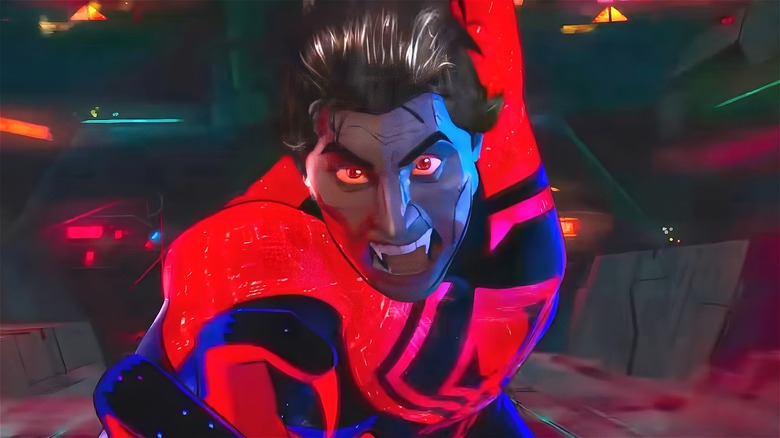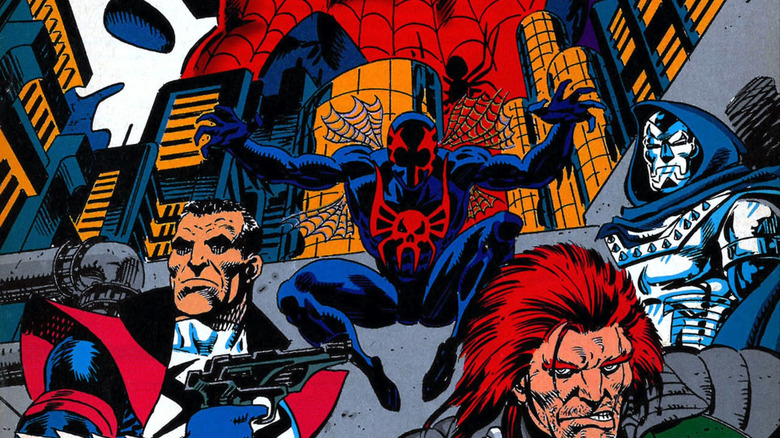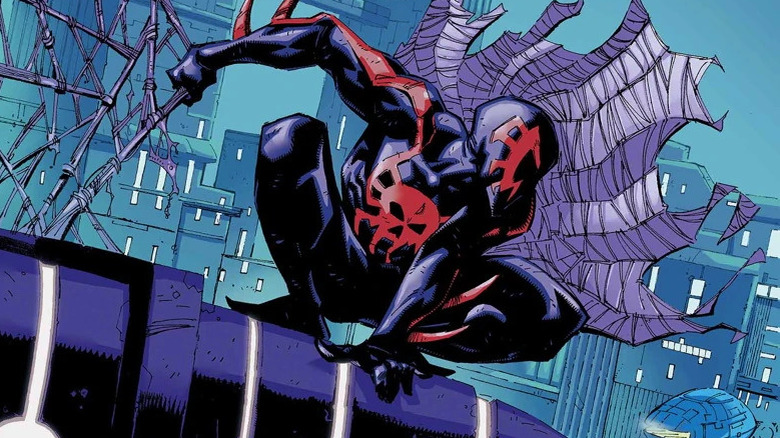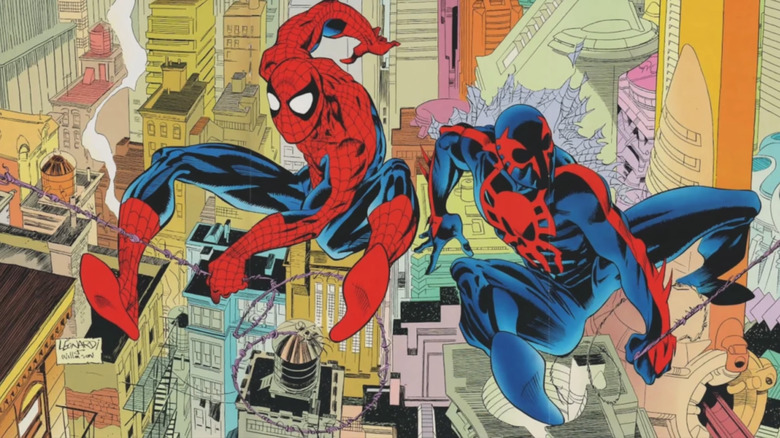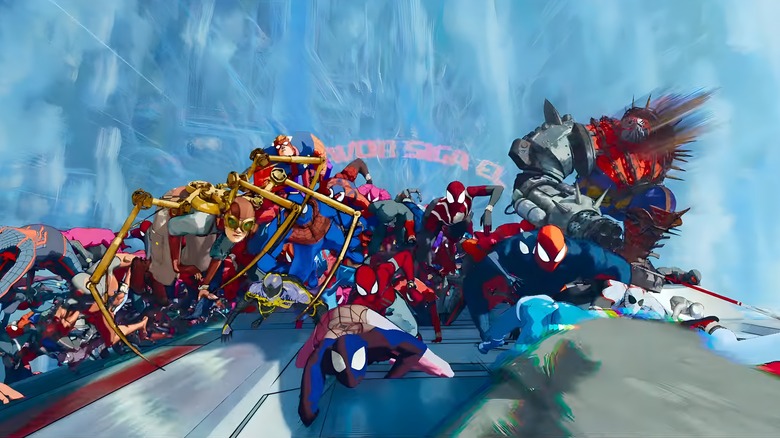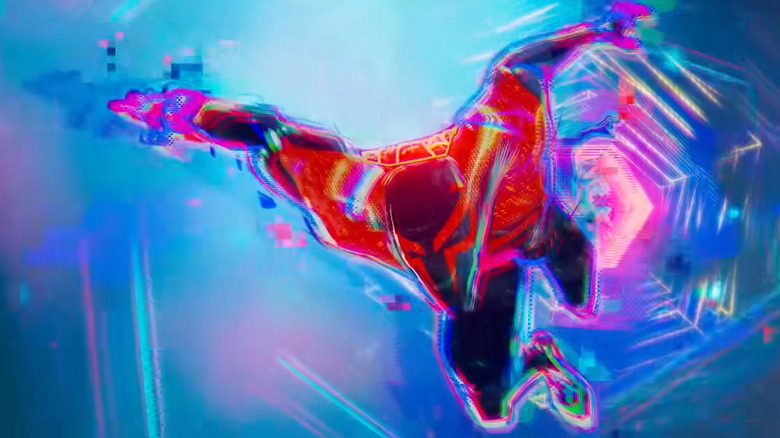Spider-Man 2099 Is The Universe Sony Must Explore Outside Of The Venomverse And MCU
With the release of Sony Pictures Animation's "Spider-Man: Across the Spider-Verse," audiences across the world are falling in love (or, more likely, love-hate) with Oscar Isaac's Miguel O'Hara, the Spider-Man from 2099. Though certain aspects of Spider-Man 2099 were fundamentally changed in service of the sequel's exceptional story, he still looks and acts a lot like the classic 1990s comic book character fans have been clamoring to see on the big screen for years — and, if Sony wants to save their troubled live-action Spider-films, this won't be the last we see of him.
What is there to say about "Morbius" and the two "Venom" films that hasn't already been said? They've been critically panned, loudly mocked, and can arguably be summarized as being exactly what detractors of superhero cinema reduce the entire genre to: CGI-heavy films with little story and even less regard for the desires of their audience. But it doesn't need to be this way.
In fact, it bears repeating that though Sony is responsible for every failure in the world of Spider-Man films, they're also responsible for each and every one of its successes — some of which ("Spider-Verse," "Spider-Man 2," the "Homecoming" trilogy, to name a few) represent the best the superhero genre as a whole has to offer. From a certain point of view, they are the perfect studio to take these stories to the next level, and what better way to do so than by exploring one of Marvel's most complex universes on the big screen?
Yes, we're arguing that the time is right for Marvel to greenlight a live-action "Spider-Man 2099" film. And to fully understand why Marvel's dark future is the perfect choice for their next phase of films, we need to look no further than the man himself: Stan Lee.
A brief history of Marvel 2099
Marvel's line of 2099 comics debuted in 1992, evolving from a Stan Lee concept called "The Marvel World of Tomorrow." Lee wanted to use the Marvel Universe to explore the general anxieties developing around technology and corporations. His goals for the 2099 comics were apparently so radical that they repelled both John Byrne and Steve Ditko — the former being a reflexive defender of corporate interests and American exceptionalism (in addition to being a well-documented xenophobe), and the latter being a Randian objectivist who had a noted fascination with law enforcement.
The early vision for 2099 was, to put it bluntly, overtly political to an almost pessimistic extent. While that might be an immediate turn-off for some, this strong creative concept prevented the 2099 line from becoming a rudderless elseworld like the Ultimates Universe where the same tropes, events, and storylines from the mainline universe were loosely recreated. Besides, the best superhero properties — from "Watchmen" to "X-Men" — usually have political ideas at play.
Where the heroes of the Marvel Universe proper would fight mad scientists and petty criminals, the grim protagonists of "2099" would put their lives and souls on the line to stop cults of social control masquerading as legitimate religions, unanimously corrupt law enforcement agencies, and billion-dollar corporations with godlike influence. Symbols of patriotism including Captain America himself were used to deceive the masses, while superpowers and advanced technology were treated like curses. There's even a bizarrely consistent trend of cannibalistic imagery (such as Miguel O'Hara's fangs) being tied to working class individuals, as if to imply that authoritarian oppression and disenfranchisement have forced them to devour one another in confused rage. It is a defiantly angry world — though not a thoughtless one.
Sony could use Spider-Man 2099 to take superhero movies into a new age
The greatest crime of Sony's Venomverse films is not that they aren't comic book accurate, or even that they lack a Spider-Man to connect them — it's that they're almost logic-defyingly bland in terms of both stories and thematic ideas.
Yes, audiences watch traditional superhero films to indulge in the fantastical escape they can create, but there is a long overdue reinvention that must take place while the genre continues to enjoy near-absolute mainstream saturation. Fans likely find themselves in a similarly anxious state that Stan Lee himself once did when he felt compelled to create the 2099 universe in the first place — that is, many are tired of escaping into these stories, and instead want something that actually speaks to our reality. The success of more topical movies like "Black Panther" demonstrate this interest. A Marvel 2099 cinematic universe could be every bit as visually dazzling and action-packed as viewers crave, but it could also be a canvas for filmmakers and audiences alike to process what's wrong with the world, and to imagine where we might one day find solutions.
The 2099 timeline doesn't belong in the MCU proper, however — it's Sony who should pick up the ball and run with it. Because while it's easy to imagine that fans of this universe want to see it adapted by Marvel Studios so that it can exist within their decades-long continuity, the MCU just isn't the right world for the cynicism of the 2099 characters. The MCU is where true heroes save the world. Sony, meanwhile, badly wants to make antihero movies, and 2099 offers them a far better array of options than their current "let's turn villains into protagonists" model ever could.
Miguel O'Hara is the antihero Sony always wanted
The best part about "Across the Spider-Verse" turning Miguel O'Hara into a household name is that it may make Sony feel confident enough to take a chance on giving him a lead role in his own film — a great achievement, because Miguel's comic book characterization is inherently risky.
Sure, for an executive taking their first glance at the studio's catalog of Spider-People, centering a universe around a future version of Spider-Man would seemingly have the benefit of getting to sell him as a Peter Parker 2.0. Miguel, though, is very much not that.
Frankly, Miguel is the anti-Peter. He was specifically designed to be just as psychologically complex, but in a radically different way. For example, instead of Peter's small but loving family, Miguel has a "complete" but disastrously dysfunctional family in the form of his abusive father, George, his emotionally traumatized mother, Conchata (who became pregnant with Miguel after having a secret affair with George's boss, Tyler Stone), his brother, Gabriel, and his girlfriend Dana — whom he proposed to after they had her own affair while he was dating his high school sweetheart, and she was dating Gabriel. As for his half-brother, Kron Stone? He becomes Venom 2099.
Taking into account the fact that Sony already shows a clear bias toward morally complex heroes, Miguel specifically has a backstory full of grounded internal and external conflict. While some may understandably find his flawed nature alienating, his origins and existence in a dystopian future give Sony's writers reasonable creative latitude to devise a subversive Spider-Man story that doesn't have to be compared to the MCU. Which is, in fact, exactly what Sony has wanted this whole time.
Across the Spider-Verse proves we need new types of Spider-Man stories
The "Spider-Verse" films are so impactful in part because they work as a meta-commentary on the state of the "Spider-Man" franchise, and in some ways, the superhero genre at large. The first film — originally written before the releases of "Wonder Woman" and "Black Panther" — asked audiences to reimagine who they thought was capable of leading a comic book movie in terms of race, nationality, gender, and body type. And now, "Across the Spider-Verse" takes this idea of necessary reinvention even further by asking us to reconsider what stories we expect from a "Spider-Man" film, not least of all because they're becoming too predictable. Tropes — or, rather, "canon events" — such as dying loved ones and traitorous friends have been repeated to the point of feeling rote no matter how well they're executed.
Meanwhile, Miguel's backstory and heroic journey defiantly reject almost every long-held Spider-Man tradition, making him the perfect vessel for a new branch of storytelling that avoids the constant revisitation and repackaging of Peter Parker's trauma. It also doesn't hurt that a live-action "Spider-Man 2099" film would have almost a century's worth of distance from any established Marvel continuity, allowing itself enough space to grow uninhibited in one of Marvel's most stylish worlds.
Spider-Man 2099 could be the future of Marvel storytelling
There just isn't another universe like Marvel 2099. Yes, there are plenty of gritty, apocalyptic future timelines and politically-charged comic book arcs, but none combine the best of both worlds in such an unapologetic way. Even better — unlike, say, "Watchmen" or "The Dark Knight Returns" — Marvel 2099 is not a deconstruction of the superhero genre, but a supporting argument for its ability to engage with complicated issues, while not sacrificing the off-the-wall imagination that makes comics so exciting. Though it borrows some aesthetic principles from "Blade Runner," Marvel 2099 is every bit as colorful, distinct, and earnest as any other story released by the publisher ... and certainly more so than Sony's Venomverse.
If you enjoyed either "Venom" film or "Morbius," that is completely fine — for better or worse, they'll continue to exist. It's just difficult to argue that any of the three films established a clear creative identity for the studio's Marvel projects, or even justified their existence as a shared universe at all. "Spider-Man 2099," meanwhile, would allow Sony to engage in a darker form of storytelling that actually has something to say, while piggybacking off Miguel O'Hara's newfound mainstream popularity. And once he launches, the 2099 universe has room for many spin-offs.
If an interconnected franchise is what Sony wants, they need to create something genuinely bold to separate them from the MCU — something visually and thematically daring, that uses established brands and iconography not to limply placate audience expectations, but to subvert them. A "Spider-Man 2099" film series has the potential to be truly revolutionary, telling forward-thinking stories with challenging subject matter. If Sony pulls it off, their universe wouldn't just be "Amazing" — it would be the future of Marvel films.
